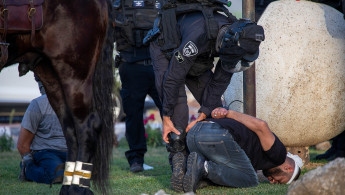Follow us on Facebook, Twitter and Instagram to stay connected
Israel declares state of emergency over Palestinians in Lod as feared Border Police are deployed
It is the first time emergency powers will be used over a Palestinian community since Israel withdrew military rule over the population in 1966.
3 min read
Dozens of Palestinian citizens of Israel have been detained [Getty]
Israel's Prime Minister Benjamin Netanyahu declared a state of emergency in the central Israeli city of Lod, after unrest on Tuesday night, warning of police would "restore law and order with an iron fist".
Netanyahu and Defence Minister Benny Gantz deployed feared Border Police units to the city, which has a large Palestinian majority.
It is the first use of emergency powers over a Palestinian community in Israel since the government withdrew military rule over the population in 1966.
Israel's Border Police are regularly deployed to protests and unrest in the occupied West Bank and East Jerusalem, but not inside Israel.
Mayor Yair Revivo said authorities had "lost control" over the city, after Palestinian protests turned Tuesday evening after long-standing discrimination against Israeli-Palestinians.
Revivo likened the situation to a "civil war" after the fatal shooting of a Palestinian-Israeli in Lod by a suspected Israeli gunman and the burning of three synagogues.
The mixed Israeli-Palestinian city has been gripped by protests since Monday evening, when anger erupted over the Israeli repression of demonstrations in Jerusalem, which has seen hundreds of Palestinians injured.
Palestinian resident Moussa Hassouna, a father of three, was shot dead in an alleged hate crime amid the protests. The alleged assailant was an Israeli civilian.
Around 8,000 people attended Hassouna's funeral on Tuesday.
Mourners raised Palestinian flags and denounced the systemic discrimination against Palestinian citizens of Israel, Arab48 reported.
|
|
Police fired tear gas and stun grenades at mourners.
By Tuesday night, anger appeared to have spread throughout the city.
Videos shared on social media showed large crowds of demonstrators, some of them throwing stones at police cars and setting fire to vehicles.
A local synagogue was also set on fire in the nearby city of Ramle, according to local media.
Unverified reports said Jewish Israeli residents of Ramle had said up makeshift checkpoints and were attacking anyone identified as a Palestine.
Mayor Revivo urged authorities to call in the military, saying the situation was "too big for the police".
"There is a failure of governance… This is a giant incident — an Intifada of Arab Israelis," he said.
Kobi Shabtai, Israel's national police chief, said the "rioting" was worse than protests during the Second Intifada.
"We are seeing a situation in the mixed cities that we have never seen before, including the incidents of October 2000," the police commissioner said.
Shabtai was referring to the widespread protests that occurred in Palestinian communities in Israel at the onset of the Second Intifada. Thirteen Palestinians were killed by police during the protests.
"We have not seen clashes like these between Jews and Arabs and nationalistic attacks like we are seeing here," Shabtai said.
The unprecedented situation in Lod comes as Israeli forces carry out airstrikes in the besieged Gaza Strip, killing at least 32 Palestinian civilians - including nine children - with the death toll rising.
Rocket fire by the Islamic Jihad and Hamas militant groups has killed at least three Israeli civilians.
Protests gripped Palestinian communities across Israel on Tuesday evening.
A police station was set on fire in the northern city of Acre and the Palestinian-majority city of Umm al-Fahm, where police fired tear as and stun grenades at demonstrators.
Protesters in Haifa, Nazareth, Baqa al-Gharbiyye and several other Palestinian-majority communities were faced with a police crackdown.
Observers say the protests are some of the most widespread among Palestinian citizens of Israel since the Second Intifada.
Dozens of Palestinian citizens of Israel have also been detained by Israeli forces.
A police station was set on fire in the northern city of Acre and the Palestinian-majority city of Umm al-Fahm, where police fired tear as and stun grenades at demonstrators.
Protesters in Haifa, Nazareth, Baqa al-Gharbiyye and several other Palestinian-majority communities were faced with a police crackdown.
Observers say the protests are some of the most widespread among Palestinian citizens of Israel since the Second Intifada.
Dozens of Palestinian citizens of Israel have also been detained by Israeli forces.





 Follow the Middle East's top stories in English at The New Arab on Google News
Follow the Middle East's top stories in English at The New Arab on Google News


